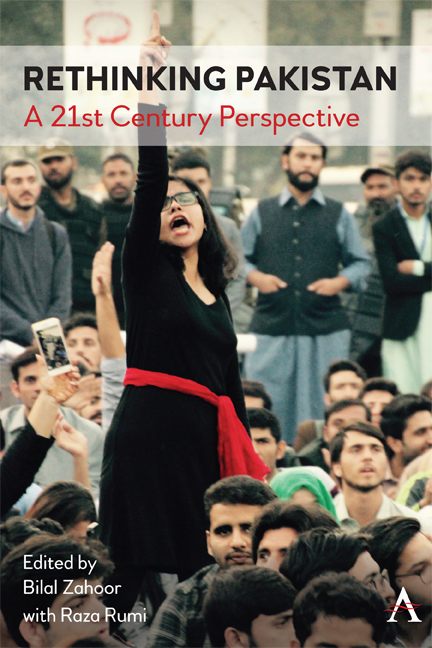Book contents
- Frontmatter
- Dedicated
- Contents
- Acknowledgements
- Introduction
- Part I Identity, Religion and Radicalisation
- Part II Development, Reform and Governance
- Part III Rights, Repression and Resistance
- Part IV Sex, Gender and Emancipation
- Part V Conflict, Diplomacy and Foreign Policy
- Contributors
- Bibliography
- Index
Chapter 7 - Labour Policies and Industrial Relations in Pakistan: A Critical Evaluation
Published online by Cambridge University Press: 20 January 2022
- Frontmatter
- Dedicated
- Contents
- Acknowledgements
- Introduction
- Part I Identity, Religion and Radicalisation
- Part II Development, Reform and Governance
- Part III Rights, Repression and Resistance
- Part IV Sex, Gender and Emancipation
- Part V Conflict, Diplomacy and Foreign Policy
- Contributors
- Bibliography
- Index
Summary
Introduction
The state has the responsibility to set the parameters for governance to be participatory, egalitarian and inclusive, with justice especially for the most depressed classes, thus enhancing human rights of all. Further, labour policies under democratic dispensations are expected to be based on the internationally accepted rights regimes. It is, therefore, tragic that during Pakistan's chequered history, regularly punctuated with long military dictatorships and intermittent “democratic dispensations”, the state has undertaken few genuine steps in favour of labour. Rather, it has constantly leaned towards an oppressive and economically unjust governance and favoured the capital and market forces. It has developed highly restrictive industrial relations and labour policies, which negate international labour covenants. The Pakistani state and the governance process, as well as the policies it generates, are made for a very small number of elite oligarchs, plutocrats and corporacrats. This is reflected in Pakistan's labour policies, and especially in the different Industrial Relation Ordinances (IRO) which are the tools for the legal implementation of such policies.
Pakistan has gone through six major labour policies: 1955, 1959, 1969, 1972, 2002 and 2018. The last is fundamentally a provincial one, so far enacted only by Sindh. All these policies were garbed in the high rhetoric of “labour rights” to cover up the nakedness of the state on the critical issues of economic justice for labour, egalitarian fairness, enhancement of democracy and the implementation of rights regimes. They were seldom, if ever, followed by requisite legislative and administrative policies and reforms. Beginning with the first 1955 labour policy, all the policies contained solemn pledges and assurances of full compliance with the principles of the International Labour Organization (ILO) Conventions. However, the actual laws promulgated – whether by military dictators or “elected governments” – have continually negated labour and human rights.
The various military dictatorships and “elected governments” have held similar views and positions on labour policies and industrial relations. This reveals a malaise of a deeply embedded colonial mindset vis-à-vis the labouring classes, even after over 70 years of independence.
- Type
- Chapter
- Information
- Rethinking PakistanA 21st Century Perspective, pp. 75 - 86Publisher: Anthem PressPrint publication year: 2020



